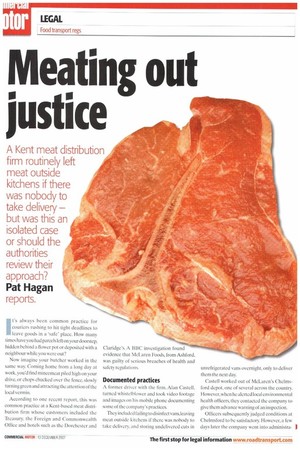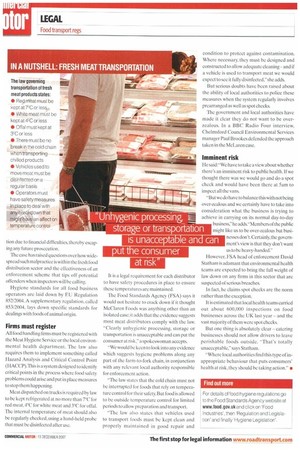Meating out justice
Page 40

Page 42

If you've noticed an error in this article please click here to report it so we can fix it.
A Kent meat distribution firm routinely left meat outside kitchens if there was nobody to take delivery — but was this an isolated case or should the authorities review their approach?
Pat Hagan reports.
It's always been common practice for couriers rushing to hit tight deadlines to leave goods in a 'safe' place. How many times have you had parcels left on your doorstep, hidden behind a flower pot or deposited with a neighbour while you were out?
Now imagine your butcher worked in the same way. Coming home from a long day at work, you'd find mincemeat piled high on your drive, or chops chucked over the fence, slowly turning green and attracting the attention of the local vermin.
According to one recent report, this was common practice at a Kent-based meat distribution firm whose customers included the Treasury, the Foreign and Commonwealth Office and hotels such as the Dorchester and Claridge's. A BBC investigation found evidence that McLaren Foods, from Ashford, was guilty of serious breaches of health and safety regulations Documented practices A former driver with the firm, Alan Castell, turned whistel blower and took video footage and images on his mobile phone documenting some of the company's practices.
They included failing to disinfect va ns, leaving meat outside kitchens if there was nobody to take delivery, and storing undelivered cuts in unrefrigerated vans overnight, only to deliver them the next day.
Castel] worked out of McLaren's Chelmsford depot, one of several across the country. However,when he alerted local environmental health officers, they contacted the company to give them advance warning of an inspection.
Officers subsequently judged conditions at Chelmsford to be satisfactory. However, a few days later the company went into administra tion due to financial difficulties, thereby escaping any future prosecution.
The case has raised questions over how widespread such malpractice is within the fresh food distribution sector and the effectiveness of an enforcement scheme that tips off potential offenders when inspectors will he calling.
Hygiene standards for all food business operators are laid down by EU Regulation 852/2004. A supplementary regulation, called 853/2004, lays down specific standards for dealings with foods of animal origin.
Firms must register
All food handling firms must be registered with the Meat Hygiene Service or the local environmental health department. The law also requires them to implement something called Hazard Analysis and Critical Control Point (HACCP).This is a system designed to identify critical points in the process where food safety problems could arise and put in place measures to stop them happening.
Meat dispatched on trucks is required by law to be kept refrigerated at no more than 7°C for red meat, 4°C for white meat and 3°C. for offal. The internal temperature of meat should also be regularly checked, using a hand-held probe that must be disinfected after use. It is a legal requirement for each distributor to have safety procedures in place to ensure these temperatures are maintained.
The Food Standards Agency (FSA) says it would not hesitate to crack down if it thought McClaren Foods was anything other than an isolated case; it adds that the evidence suggests most meat distributors comply with the law. "Clearly unhygienic processing, storage or transportation is unacceptable and can put the consumer at risk," a spokeswoman accepts.
We would be keen to look into any evidence which suggests hygiene problems along any part of the farm-to-fork chain, in conjunction with any relevant local authority responsible for enforcement action.
"The law states that the cold chain must not be interrupted for foods that rely on temperature control for their safety. But food is allowed to be outside temperature control for limited periods to allow preparation and transport.
-The law also states that vehicles used to transport foods must be kept clean and properly maintained in good repair and condition to protect against contamination. Where necessary, they must be designed and constructed to allow adequate cleaning and if a vehicle is used to transport meat we would expect to see it fully disinfected," she adds.
But serious doubts have been raised about the ability of local authorities to police these measures when the system regularly involves prearranged as well as spot checks.
The government and local authorities have made it clear they do not want to be overzealous. In a BBC Radio Four interview, Chelmsford Council Environmental Services manager Paul Brookes defended the approach taken in the McLaren case.
Imminent risk
He said:"We have to take a view about whether there's an imminent risk to public health. If we thought there was we would go and do a spot check and would have been there at 5am to inspect all the vans.
"But we do have to balance this with not being over-zealous and we certainly have to take into consideration what the business is trying to achieve in carrying on its normal day-to-day business," he adds."Members of the public might like us to be over-zealous but businesses don't. Certainly, the government's view is that they don't want us to be heavy-handed."
However, FSA head of enforcement David Statham is adamant that environmental health teams are expected to bring the full weight of law down on any firms in this sector that are suspected of serious breaches.
In fact, he claims spot checks are the norm rather than the exception.
It is estimated that local health teams carried out about 600,000 inspections on food businesses across the UK last year and the vast majority of them were spot checks.
But one thing is absolutely clear catering businesses should not allow drivers to leave perishable foods outside. -That's totally unacceptable," says Statham.
"Where local authorities find this type of inappropriate behaviour that puts consumers' health at risk, they should be taking action." •






















































































































































































